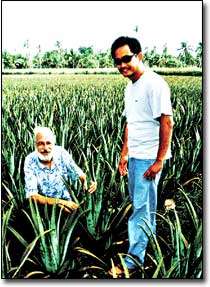NUKU‘ALOFA, KINGDOM OF TONGA — Kekaha-born, John Aquino, a United States representative for South Pacific Aloe and Botanicals, Ltd. is working with chemists, growers, exporters and business associates to implement a full-scale aloe vera export scheme which includes processing and
NUKU‘ALOFA, KINGDOM OF TONGA — Kekaha-born, John Aquino, a United States representative for South Pacific Aloe and Botanicals, Ltd. is working with chemists, growers, exporters and business associates to implement a full-scale aloe vera export scheme which includes processing and exportation operation in the Kingdom of Tonga.
Aloe vera gel, extracted from leaves of a large genus of succulent related to lilies, is a highly valued ingredient in health supplements, and personal care products like shampoo and skin creams.
“Last year, we completed the construction phase of our processing facility in Nuku‘alofa’s industrial complex,” said Aquino. “With the additional acreage we’ve seen being planted, aloe vera is on its way to becoming a viable agricultural option for local growers.”
Currently, Tonga’s leading cash are vanilla, squash and coffee.
However, Aquino said aloe has advantages over those crops.
“Aloe vera has no local enemies or pests that eat the self-propagating plants, and that means low maintenance to grow.”
Unlike coffee and vanilla which take three years to yield a harvest, aloe pups or baby plants averaging 20 to 25 centimeters, when transplanted, will grow to maturity in only 12 to 16 months and can be harvested four times a year.
Mature aloe plants continue to yield for a full five years during which time they produce 10 pups, which are transplanted to beds when 7 to 8 centimeters tall.
This procedure reduces the nutrient drain on the mother, while providing farmers with free plants for future growth.
Mature plants that are transplanted require three to four months to re-establish their harvesting cycle.
With aloe, start-up costs need not be repeated as with squash which require seeds, and replanting every year.
Also squash requires fertilizer, herbicides and pesticides; all that is required with aloe is monthly weeding.
At harvest time, the aloe grower just calls the local processing facility. There’s no guessing about final market pricing while the product is en route to overseas markets as with squash.
Aquino said one of the main challenges after completing the facility was to keep it operational. “We’re meeting that challenge offering land owners three options.
“They are straight government leases of vacant land, private leases with land owners who agree to allow SPAB to plant, maintain and harvest the aloe for either 5 or 10 years. The third option is for farmers with their own land to plant, maintain the aloe, with SPAB to harvest the leaves.”
Aquino provides growers with technical supervision on the planting of aloe, ranging from setting up the rows to proper plant spacing and maintenance tips.
With adherence and agricultural diligence come four harvests per year, average yields totaling $67,200 pa‘anga per 8-acre parcel or $8,400 pa‘anga per acre.
By comparison vanilla and coffee both require constant pruning and protecting from pests, fertilizing and require three years to yield a harvest.
Aloe vera, with the convenience of a local processing facility, is not only a viable agricultural export option, but offers the Kingdom of Tonga an opportunity to expand its agricultural sector.
And although the aloe project keeps him busy, Aquino has found that his stay in the deeply religious, Christian island nation renowned for its commitment to its ancient culture, very spiritually rewarding.
Aquino will return to Kaua‘i later this month, but remains fully involved in the operation and will return to Tonga to oversee harvests and processing when required.


